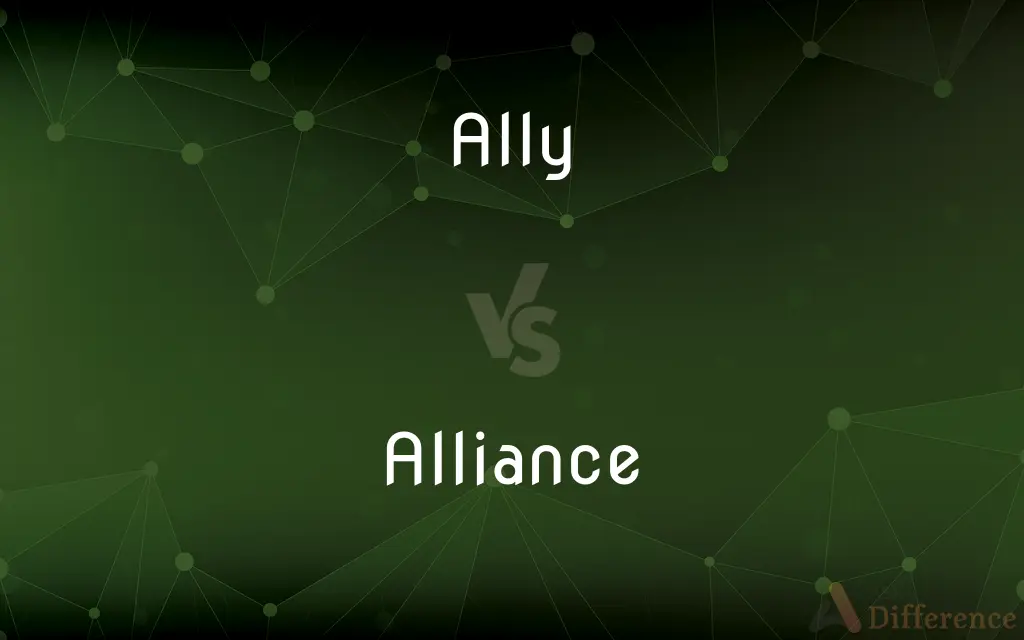Ally vs. Alliance — What's the Difference?
Edited by Tayyaba Rehman — By Urooj Arif — Updated on April 3, 2024
An ally is a state that cooperates with another, while an alliance is the formal agreement or pact between them.

Difference Between Ally and Alliance
Table of Contents
ADVERTISEMENT
Key Differences
An ally typically refers to a country that supports and cooperates with another country in matters of mutual interest, such as defense, policy, or economic goals. This support can range from diplomatic backing to military assistance. On the other hand, an alliance is a formal agreement or pact between two or more countries to collaborate on specific issues, often outlined in a treaty or other legal document, defining the terms and conditions of their cooperation.
While an ally acts based on mutual interests and informal agreements, an alliance represents a formalized relationship with specific commitments and obligations. For instance, allies might support each other through economic aid or military equipment, whereas members of an alliance are often bound by treaty to provide military assistance in case one member is attacked.
The concept of an ally is broader and can include nations with shared values and goals, even without a formal agreement. Meanwhile, an alliance is a concrete expression of partnership, usually established for strategic, economic, or political purposes, and can include mechanisms for dispute resolution and joint decision-making.
An ally relationship can be unilateral, with one country supporting another without expecting formal assistance in return. In contrast, alliances are typically reciprocal, with all parties agreeing to mutual support and cooperation under defined circumstances.
The importance of an ally can fluctuate with changing geopolitical landscapes and national interests, whereas an alliance, being a formal agreement, provides a more stable and predictable framework for international relations and cooperation among its members.
ADVERTISEMENT
Comparison Chart
Definition
A state that cooperates with another
A formal agreement between states
Nature
Informal or based on mutual interests
Formalized with specific commitments
Scope
Can be broad, including shared values
Concrete, with defined objectives
Reciprocity
Can be unilateral
Typically reciprocal
Stability
May change with geopolitical shifts
More stable due to formal agreements
Compare with Definitions
Ally
Mutual cooperation.
Canada is a key ally of the United States, sharing common defense interests.
Alliance
Formal agreement.
NATO is an alliance that provides collective defense for its members.
Ally
Flexible relationships.
The nation sought new allies to enhance its trade opportunities.
Alliance
Stable framework.
The alliance established a permanent council to address security challenges together.
Ally
Dynamic partnerships.
The nation's status as an ally strengthened after collaborating on several international projects.
Alliance
Treaty-based cooperation.
The countries entered into an alliance to promote regional stability.
Ally
Diplomatic support.
The country found an ally in its efforts to combat climate change globally.
Alliance
Defined commitments.
The alliance included specific commitments to mutual defense and intelligence sharing.
Ally
Unilateral support.
The country provided humanitarian aid to its ally without expecting anything in return.
Alliance
Reciprocal obligations.
Members of the alliance are obligated to provide economic support during crises.
Ally
To place in a friendly association, as by treaty
Italy allied itself with Germany during World War II.
Alliance
An alliance is a relationship among people, groups, or states that have joined together for mutual benefit or to achieve some common purpose, whether or not explicit agreement has been worked out among them. Members of an alliance are called allies.
Ally
To unite or connect in a personal relationship, as in friendship or marriage.
Alliance
A close association of nations or other groups, formed to advance common interests or causes
An alliance of labor unions opposing the bill.
Ally
To enter into an alliance
Several tribes allied to fend off the invaders.
Alliance
A formal agreement establishing such an association, especially an international treaty of friendship.
Ally
One that is allied with another, especially by treaty
Entered the war as an ally of France.
Alliance
A connection based on kinship, marriage, or common interest; a bond or tie
The shifting alliances within a large family.
Ally
One in helpful association with another
Legislators who are allies on most issues.
Alliance
A long-term association of two or more animals of the same species, in which members cooperate for a purpose such as gaining access to mates or defending territory.
Ally
An animal that cooperates with another animal of the same species in an alliance.
Alliance
Close similarity in nature or type; affinity
The ancient alliance between mathematics and music.
Ally
The nations allied against the Central Powers of Europe during World War I. They were Russia, France, Great Britain, and later many others, including the United States.
Alliance
The act of becoming allied or the condition of being allied
The church, acting in alliance with community groups.
Ally
The nations, primarily Great Britain, France, the Soviet Union, and the United States, allied against the Axis during World War II.
Alliance
(uncountable) The state of being allied.
Matrimonial alliances
An alliance between church and state, or between two countries
Ally
(transitive)
Alliance
(countable) The act of allying or uniting.
Ally
To unite or form a connection between (people or things), as between families by marriage, or between states by confederacy, league, or treaty.
Alliance
(countable) A union or connection of interests between families, states, parties, etc., especially between families by marriage and states by compact, treaty, or league.
Ally
Chiefly followed by to or with: to connect or form a relation to (someone or something) by similarity in features or nature.
Alliance
(countable) Any union resembling that of families or states; union by relationship in qualities; affinity.
Ally
(reflexive) To join or unite (oneself or itself) against, with, etc., someone or something else.
Alliance
(with the definite article) The persons or parties allied.
Ally
(intransitive) Chiefly followed by with: to enter into an alliance or unite for a common aim.
Make common cause
Alliance
(India) Marriage.
Ally
A person who co-operates with or helps another; an associate; a friend.
Alliance
(obsolete) To connect or unite by alliance; to ally.
Ally
A person who, or organization which, supports a demographic group subject to discrimination and/or misrepresentation but is not a member of the group; specifically (LGBT), a person who is not a member of the LGBT+ community but is supportive of it.
I’m glad you want to be a better ally to the disabled.
Alliance
The state of being allied; the act of allying or uniting; a union or connection of interests between families, states, parties, etc., especially between families by marriage and states by compact, treaty, or league; as, matrimonial alliances; an alliance between church and state; an alliance between France and England.
Ally
A person, group, state, etc., which is associated or united by treaty with another for a common (especially military or political) purpose; a confederate.
The two countries were allies in World War I.
Alliance
Any union resembling that of families or states; union by relationship in qualities; affinity.
The alliance of the principles of the world with those of the gospel.
The alliance . . . between logic and metaphysics.
Ally
Something regarded as connected with or related to another thing by similarity in features or nature.
Alliance
The persons or parties allied.
Ally
(taxonomy) An organism which is related to another organism through common evolutionary origin; specifically, a species which is closely related to another species, usually within the same family.
The order of Gruiformes includes cranes and their allies.
Alliance
To connect by alliance; to ally.
Ally
(figuratively) A person, group, concept, etc., which is associated with another as a helper; an auxiliary; a supporter.
Alliance
The state of being allied or confederated
Ally
A kinsman or kinswoman; a relative.
Alliance
A connection based on kinship or marriage or common interest;
The shifting alliances within a large family
Their friendship constitutes a powerful bond between them
Ally
One's relatives; kin, kindred, relations; also, relationship through descent or marriage; kinship.
Alliance
An organization of people (or countries) involved in a pact or treaty
Ally
People, groups, states, etc., which are associated or united with each other for a common purpose; confederates; also, the state of being allied; alliance, confederation.
Alliance
A formal agreement establishing an association or alliance between nations or other groups to achieve a particular aim
Ally
Alternative spelling of alley
Alliance
The act of forming an alliance or confederation
Ally
To unite, or form a connection between, as between families by marriage, or between princes and states by treaty, league, or confederacy; - often followed by to or with.
O chief! in blood, and now in arms allied.
Ally
To connect or form a relation between by similitude, resemblance, friendship, or love.
These three did love each other dearly well,And with so firm affection were allied.
The virtue nearest to our vice allied.
Ally
A relative; a kinsman.
Ally
One united to another by treaty or league; - usually applied to sovereigns or states; a confederate.
The English soldiers and their French allies.
Ally
Anything associated with another as a helper; an auxiliary.
Science, instead of being the enemy of religion, becomes its ally.
Ally
Anything akin to another by structure, etc.
Ally
See Alley, a marble or taw.
Ally
A friendly nation
Ally
An associate who provides assistance;
He's a good ally in fight
They were friends of the workers
Ally
Become an ally or associate, as by a treaty or marriage;
He allied himself with the Communists
Common Curiosities
Can an ally relationship evolve into an alliance?
Yes, ally relationships can evolve into formal alliances through treaties and agreements.
What is an alliance?
An alliance is a formal agreement between two or more countries for mutual benefit, often including security and defense.
Can countries be allies without being in an alliance?
Yes, countries can be allies through informal partnerships and shared interests without a formal alliance.
What role do alliances play in international relations?
Alliances play a critical role in shaping international relations by formalizing cooperation and setting collective goals.
Are alliances binding?
Yes, alliances are binding agreements that obligate members to fulfill their commitments, unlike informal ally relationships.
Is an alliance always military in nature?
No, alliances can be based on economic, environmental, or political cooperation, not just military.
How are disputes resolved within an alliance?
Alliances often include mechanisms for dispute resolution to handle disagreements among members constructively.
What are the key differences between an ally and an alliance?
The key difference is formality; allies cooperate based on mutual interests, while an alliance is a formal pact with specific commitments.
How does an alliance benefit its members?
An alliance provides a structured framework for cooperation, ensuring mutual support and often enhancing collective security.
Can an alliance have non-state members?
Typically, alliances are between sovereign states, but organizations or entities may participate in certain roles.
What defines an ally?
An ally is defined by mutual cooperation and support between countries, often informally.
What happens if a country wants to leave an alliance?
Leaving an alliance usually requires following specific procedures outlined in the alliance’s founding documents.
Do allies spy on each other?
While allies generally cooperate, instances of espionage can occur, often leading to tensions.
How do countries become allies?
Countries become allies through diplomatic negotiations, shared interests, and sometimes through historical connections.
Why might an alliance be formed?
Alliances are formed for various reasons, including defense, economic benefits, political stability, and addressing global challenges.
Share Your Discovery

Previous Comparison
Smart vs. Genius
Next Comparison
Enchantress vs. WitchAuthor Spotlight
Written by
Urooj ArifUrooj is a skilled content writer at Ask Difference, known for her exceptional ability to simplify complex topics into engaging and informative content. With a passion for research and a flair for clear, concise writing, she consistently delivers articles that resonate with our diverse audience.
Edited by
Tayyaba RehmanTayyaba Rehman is a distinguished writer, currently serving as a primary contributor to askdifference.com. As a researcher in semantics and etymology, Tayyaba's passion for the complexity of languages and their distinctions has found a perfect home on the platform. Tayyaba delves into the intricacies of language, distinguishing between commonly confused words and phrases, thereby providing clarity for readers worldwide.













































